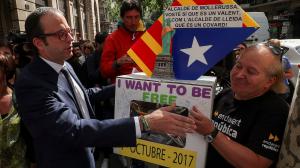Referendums on the march – TGTE Condemns Violence to Suppress The Right To Decide in Catalonia
This week the International Community witnessed another referendum conducted by a non-state entity in the face of opposition from the national state and the international powers. Below, please find a video.
As documented in the “Catalonia’s Legitimate Right To Decide” publication, between 1905 and 1991, 52 sub-state entities held referendums in relation to independence. Since 1991 alone, 53 independence related referendums were held, of which 26 were held in opposition of the national state.
On October 1, 2017, Catalonia held a binding referendum on the issue of independence. The Catalonian people premised the referendum on their “right to decide” based on the civic and liberal conception and the Catalan Nation as demonstrated by the 2013 Resolution of the Catalan Parliament called “Declaration of Sovereignty and The Right To Decide of the People of Catalonia.” The Resolution emphasized that the referendum is based on the principle of democracy. The Catalan people viewed the referendum as a legitimate exercise of equal dignity. The referendum is a manifestation of direct democracy as opposed to representative democracy.
The October 1st referendum was the culmination of concerted, vibrant and sustained action of the organized civil society and the Catalan media. The politicized civil society mobilized the Catalan people, the elites and the political leaders through marches and massive rallies under the slogan “We Are A Nation, We Have The Right To Decide” and political events. In addition to the massive demonstrations, referendums on independence were organized by the civil society in 552 towns in Catalonia between 2009 and 2011. In 2014, a non-binding referendum was held throughout Catalonia as “Participation Process.”
The offer of more money and greater financial autonomy in return for giving up referendum made by the Spanish Economy Minister, Luis de Guindos, again demonstrates the fact that referendums as well as calls for referendum increase the bargaining power of the people. In addition, the call for referendum also gives a momentum to the people’s political narrative and helps place them in the international radar.
Like with the Kurdistan Referendum, the Catalonia Referendum was also opposed by the national state and the international powers. Prior to the referendum, the U.S. President Donald Trump stated that the U.S. opposed an independence drive in Catalonia, and Spain should remain united. After the referendum, EU Commission President, Jean-Claude Juncker, issued a statement stating that Brussels must respect the decision of the Spanish Government and its Constitutional Court.
Madrid sent the national police to Catalonia, seized more than 2 million ballots, blocked schools and public places which were to be polling stations, and arrested leaders of the pro-independence movement. The Spanish Constitutional Court citing Article 2 of the Spain Constitution which states that “the country is indivisible” held that the referendum was illegal. The Catalan people responded to the above with their most powerful weapon, their fundamental right to vote.
It should be noted that unlike the Sri Lankan 1972 and 1978 Constitutions in which the Tamils never participated in the Constitutional making process nor gave their allegiance, the Catalan people had accepted the 1978 Spain Constitution. However, due to subsequent events, the Catalan people took the position that Spain’s Constitution had neither legal validity nor a political legitimacy over them.
The Catalan referendum in which more than 2.2 Million people participated demonstrates that inserting words such as “indivisible” or “undivided” in Constitutions cannot put out the fire of freedom in the people. Catalonian President, Carles Puigdemont, said that he was willing to go to jail if it meant giving the Catalonia people a chance to decide their future.
Transnational Government of Tamil Eelam (TGTE) unequivocally condemns the violence employed by the Spanish Government to suppress the people’s right to vote.
As stated by Professor David Phillips of Columbia University, a renowned practitioner in conflict resolution, in his remarks to TGTE in connection with the Catalonia Referendum, “violence is never the right response when people exercise their democratic rights, including their right to self-determination. Political dialogue is the only way to resolve competing demands.”
It is heartening to see that violence has been condemned across the board. The Scottish Prime Minister, Nicola Sturgeon, Belgium’s Prime Minister, Charles Michel, UK’s Labor Party Leader, Jeremy Corbyn, have all condemned the violent tactics of the Spanish Government unequivocally.
The violence unleashed upon peaceful exercise of the right to decide has a profound impact. As one of the Catalonian voters observed, it was like a turning point, the moment the cord was finally cut. Gideon Rachman, a columnist in Financial Times, stated that “the weekend’s events make it likely that Spain will ultimately have to allow a vote on Catalan Independence”
If we Tamils in the island of Sri Lanka are cognizant of the current international trend, if we realize that the freedom struggle really runs from bottom up and not from top down, and if we assert our individual right as well as the collective right of the Tamil Nation, “the right to decide”, the days when Tamil Eelam joins the family of nation states are not far away.

